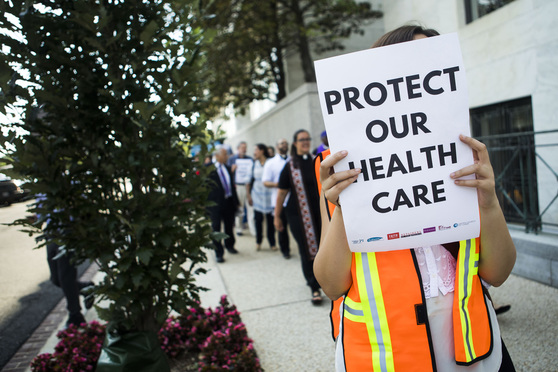 People demonstrate against the planned GOP health care bill that would do away with much of Obama's Affordable Care Act outside the Hart and Dirksen Senate Office Buildings, on July 13, 2017. (Photo: Diego M. Radzinschi/ALM)
People demonstrate against the planned GOP health care bill that would do away with much of Obama's Affordable Care Act outside the Hart and Dirksen Senate Office Buildings, on July 13, 2017. (Photo: Diego M. Radzinschi/ALM)
Americans have been deeply divided on the Affordable Care Act since it was passed into law in 2010. A May 2020 Kaiser Family Foundation poll shows 51% of surveyed adults have favorable views of the law, while 41% of those polled view the law unfavorably. However, recent events suggest perhaps the gap is widening in favor of "Obamacare."
Voters in Oklahoma decided to expand Medicaid health insurance under the ACA to tens of thousands low-income residents. The question was decided by one percentage point, NBC News reports, with 50.5 percent votes in favor of State Question 802 and 49.5 percent opposed.
Related: Medicaid expansion: Strong positive outcomes for states
The Trump administration asked the Supreme Court in June to strike down the whole of Obamacare. In his brief for the administration, U.S. Solicitor General Noel Francisco argued that the law "must fall" after Congress eliminated the ACA's tax penalty for those who did not purchase health insurance. President Trump won Oklahoma in 2016 by 36 points.
Oklahoma is not the only red state to expand Medicaid under the ACA; Utah, Nebraska and Idaho have also done so by amending state statutes. The president is still expected to handily win these states this year, but the coronavirus pandemic and its resurgence in several reopening states have highlighted some possible tensions between the president and his base.
According to a report from the Department of Health and Human Services, enrollment in Obamacare leapt by 46 percent in June, with nearly half a million consumers gaining coverage under the law. Enrolling in the ACA is one of the few options available for people who lost their insurance when they lost their jobs as a result of the pandemic.
Exit polls conducted during the 2018 midterm elections showed that health care was the top issue for voters. Those who cited it as their most important issue preferred Democratic candidates in House races by 52 points.
Defending the administration's attempts to roll back Obamacare, White House spokesman Judd Deere said, "A global pandemic does not change what Americans know: Obamacare has been an unlawful failure and further illustrates the need to focus on patient care."
The administration's replacement proposals in 2017 included rolling back Medicaid coverage and weakening protections for pre-existing conditions, none of which passed the Republican-controlled Congress. Due to the lack of an alternative health care plan coming from the administration, Democrats see an opening in battleground states.
"He just keeps giving us more ammunition," Guy Cecil, the chair of the Democratic super PAC Priorities USA, said of the president.
"People, even Trump voters, want their Medicaid. Trump just wants applause from right-wing Twitter for taking it away," said Democratic consultant Jesse Ferguson. "The 2020 election will be pretty simple: if you want more sick people without health care coughing on you, vote Trump."
Recommended For You
© Touchpoint Markets, All Rights Reserved. Request academic re-use from www.copyright.com. All other uses, submit a request to [email protected]. For more inforrmation visit Asset & Logo Licensing.






